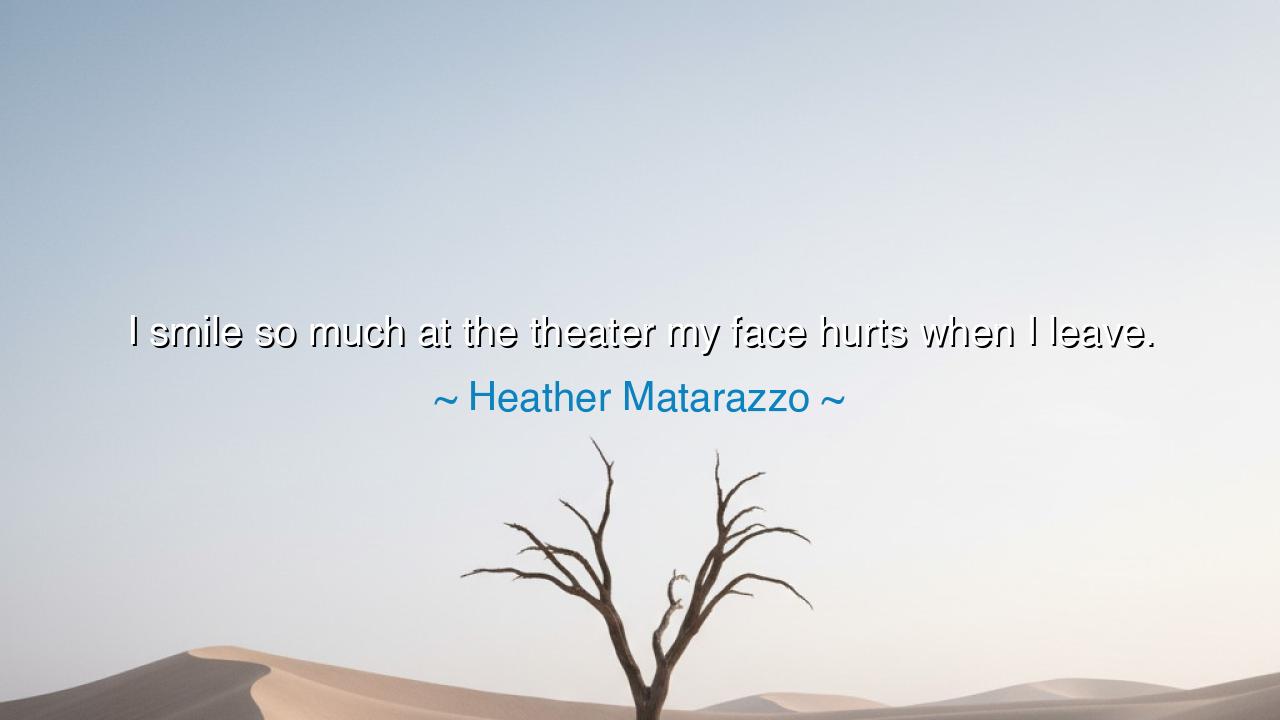
I smile so much at the theater my face hurts when I leave.






Hear now, O listener, the joyful words of Heather Matarazzo: “I smile so much at the theater my face hurts when I leave.” Though spoken lightly, these words are filled with the deep truth of human experience, for they reveal the theater not merely as entertainment, but as a fountain of delight, a sacred gathering place where souls are lifted beyond the burdens of the day.
The meaning of this reflection lies in its celebration of joy. To smile so much that one feels pain is to be overwhelmed by happiness, to be drawn into a world where laughter, wonder, and human connection overflow. The theater becomes not a building of brick and stage, but a sanctuary where stories awaken emotions so powerful that the body itself cannot contain them. It is proof that art has the power to move us beyond thought, into pure, radiant feeling.
The origin of this wisdom reaches back into the very roots of civilization. In ancient Greece, theater was not a pastime but a sacred act, performed in honor of Dionysus, the god of ecstasy and renewal. Tragedy taught catharsis, comedy inspired smiles and laughter, and together they reminded the people of their shared humanity. The Roman amphitheater carried this tradition forward, and across cultures, theater has always been a place where the human spirit is refreshed. Matarazzo’s words echo this eternal truth: that when the stage is alive, the heart is alive also.
History offers vivid examples of this. During the Great Depression, when hunger and despair gripped millions, the people flocked to theaters to see musicals and comedies. Fred Astaire and Ginger Rogers, with their graceful dances and playful songs, gave audiences the chance to smile until their hearts ached. Though their lives were burdened outside the doors, for a few hours they left with faces sore from laughter and joy. In this way, theater became more than distraction—it became survival, sustaining the human spirit in times of trial.
There is also wisdom here about the power of community. To sit in a theater and laugh, cheer, or cry is to share in an experience larger than oneself. When Matarazzo leaves with her face aching from smiles, it is not only the performance that created this joy, but the collective energy of people joined together in celebration. This shared joy is one of the oldest medicines of the soul, reminding us that we are never alone, that beauty and humor are magnified when shared.
Practically, her words invite us to seek out spaces that rekindle our capacity for joy. Whether in a grand theater, a small playhouse, or even a gathering of friends telling stories, we must not neglect the need to laugh, to smile, to let art carry us into lightness. In times of hardship, such moments are not trivial—they are essential. For the soul that forgets to smile grows heavy, and the heart that forgets to laugh grows weary.
So, O listener, take this lesson deep: pursue joy with the same devotion that others pursue wealth. Do not be ashamed of laughter, nor of a face that aches from smiling. These are signs that you have touched the sacred, that art has done its work, and that life itself has poured delight into your being.
Thus the teaching endures: the theater is a mirror of humanity, a wellspring of laughter, and a forge for community. If you leave its doors with cheeks sore from smiles, know that you have received one of life’s most precious gifts—the reminder that joy is as vital as bread, and laughter as holy as prayer.






AAdministratorAdministrator
Welcome, honored guests. Please leave a comment, we will respond soon